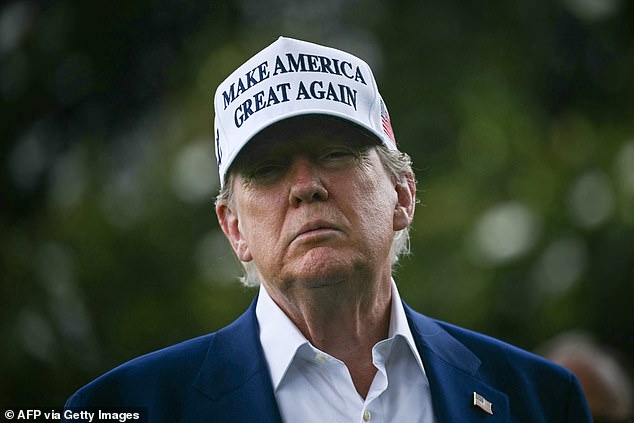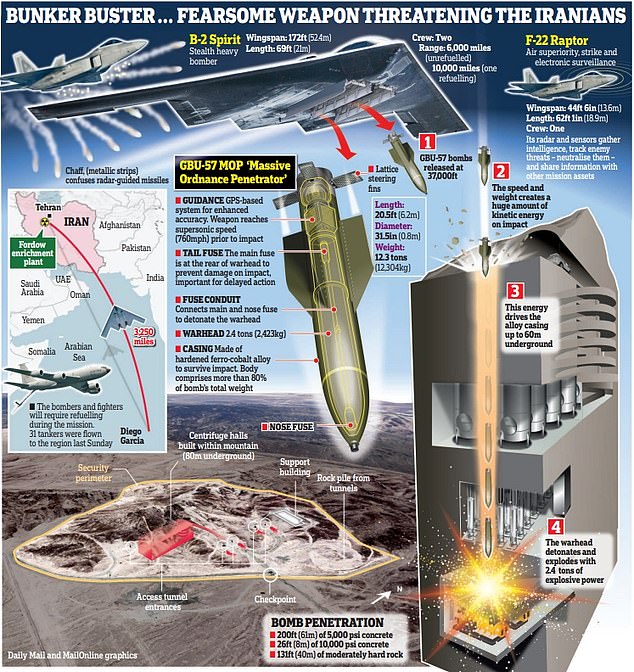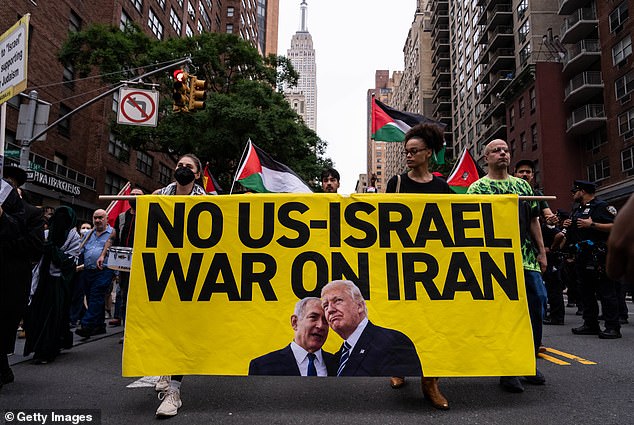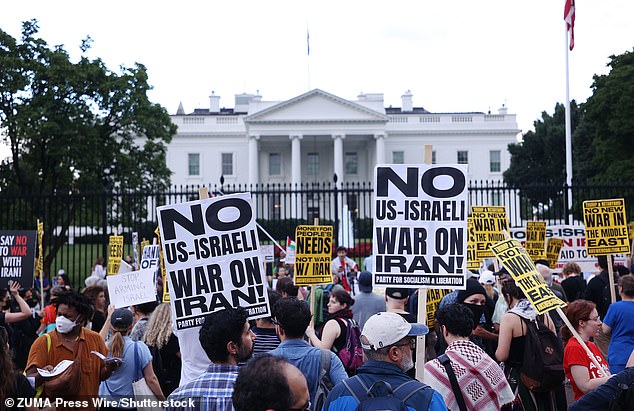Donald Trump loves to back a winner. And with the military momentum now heavily on Israel‘s side, it would be no surprise if the 47th President eventually decides to join the party and attack Iran‘s key nuclear facilities.
The prospect of a quick win – of epoch-making regime change, even – must be tempting for a man who has already let it be known he wants a Nobel Peace Prize.
Much has been made of America’s 15-ton Massive Ordnance Penetrator, the GBU-57, the only bomb in the world thought capable of reaching Iran’s heavily protected nuclear enrichment plants.
Delivered by giant B2 stealth bombers, this ‘bunker buster’ has been specifically developed to destroy targets deep underground.
The theory is that a series of GPS-guided bombs can be dropped in perfect sequence, one on top of the other, each penetrating 200ft deeper until the target is reached.
Yet, however impressive the technology, the task remains formidable.
Any attempt to knock out Iran’s nuclear capability means destroying the Fordow enrichment facilities, which lie below as much as half a mile of rock and reinforced concrete. Even the main entrance is hidden, Bond-style, hundreds of feet below ground.
To have any hope of success, the futuristic B2 bombers have to travel, unscathed, deep into the heart of Iran.

Donald Trump loves to back a winner, writes Mark Almond, but he knows the bunker buster bombs and not yet been tested on the battlefield

Trump’s advisers will also know that the famed ‘bunker busters’ have never yet been tested on the battlefield.
True, the Israelis used a similar approach to kill Hezbollah leader Hassan Nasrallah last autumn in Beirut.
But the precision bombs used then were much smaller and Nasrallah was only 60ft below the surface when he was blown up.
In short, it’s not at all clear that any American attempt to destroy Fordow or its uranium enrichment facilities will succeed.
Military failure is not the only danger facing Trump, should he decide to press ahead with a bombing raid. There is no sign that an attack, even if successful, would lead to an Iranian surrender or bring the fighting to a convenient close.
I would put money on the opposite in fact. The mullahs are fighting for their lives.
With millions of Iranians enraged by years of oppression and incompetence, a humiliating surrender would mean certain death to the regime – and its leaders.
For the sake of their own survival, the mullahs must be seen to strike back at Israel and America – and continue lashing out – raising the stakes ever higher as they do so. That’s why many fear, for example, that Iran will close the Strait of Hormuz, the narrow seaway which carries a fifth of the world’s oil and liquified gas.
There are already reports that Tehran is using electronic warfare to disrupt shipping in the Strait, leading to at least one major collision.
Desperate, the ayatollahs have threatened to take the fight to the Great Satan itself, with attacks on American bases in neighbouring countries.
Or they might unleash terrorist and sabotage groups against US citizens and their business interests around the Middle East and beyond. The Little Satan, the UK, will also be in the crosshairs, the more so if the ayatollahs think twice about daring to provoke Uncle Sam.
The Diego Garcia base on the Chagos Islands – still owned by Britain – is the likely launch pad for any B2 strikes and could suffer retaliation.
But the British military bases on Cyprus might make a better target. Firing missiles at British intelligence and electronic surveillance assets at Akrotiri on the south Cyprus coast – which are umbilically linked to the work of the US spy agencies – would send a stark message, not only to Whitehall but to Washington’s allies: there is a steep price to be paid for backing America. Iran has no nuclear weapons, but it does have chemical weapons. Should these be used on Tel Aviv, there is no saying what level of destruction will be rained down on Tehran in response. Many in Israel see this as an existential struggle, after all.
It is all the more troubling that leadership in the region is so unstable.
Iran’s Ayatollah Khamenei is not the only one under vast pressure.
It is unlikely that Benjamin Netanyahu’s political career can survive anything short of a complete victory: the destruction of Iran’s nuclear capacity and regime change.

A protest calling for the Trump administration to avoid a war with Iran in New York City

Demonstrators hold signs outside the White House in Washington DC
The Israeli prime minister, remember, faces prosecution on corruption charges at home and is desperate to claim a major victory.
His critics have accused Netanyahu of wanting to keep his nation at war for as long possible, ensuring that he remains in post – and out of court.
Donald Trump himself, is a long way from predictable, of course.
Now 79, the president has been showing symptoms of a scatter-gun approach to problems ranging from world trade and migration to war in Ukraine.
The death of American servicemen could easily provoke a violent response from Washington, which has moved three US nuclear-powered aircraft carrier groups within striking distance of Iran in the last few days.
Other nuclear-armed powers also have an interest in the region, of course.
Moscow will be loath to lose such an important ally as Tehran, although for the moment President Putin seems powerless to intervene.
But China could, and very well might. Iran offers an essential transport link for China’s vast exports to Europe and the Middle East now that the railway route through Russia has been blocked by sanctions (following Putin’s invasion of Ukraine).
China also imports oil and liquefied natural gas from Iran and its neighbours by sea.
Any further disruption would be bad for world energy prices – and Trump’s chances at the polls – but would hit China’s economy particularly hard.
Beijing’s navy has been designed to fight a US fleet in the western Pacific, but it is perfectly well-equipped to clash with American warships blockading Iran. Now there are reports of Chinese surveillance ships in the Gulf.
So, even if the fear of Iranian nukes is exorcised, other apocalyptic scenarios are fast developing.
Sparks from the Middle East could fly far – and ignite a vastly bigger war, perhaps even with a nuclear dimension.
Iran is no longer a problem from which Trump can walk away – although I’m in little doubt that he will try if the situation starts unravelling.
While President Harry Truman, who authorised the nuclear bombing of Japan in 1945, had a sign on his desk reading ‘the buck stops here’, Trump has shown a very different cast of mind, preferring to blame others.
But conflict takes on a life of its own. As Trotsky once warned: ‘You might not be interested in war, but war is interested in you.’
America – and the rest of us – must pray we don’t have to learn his lesson the hard way.
Mark Almond is director of the Crisis Research Institute, Oxford.












